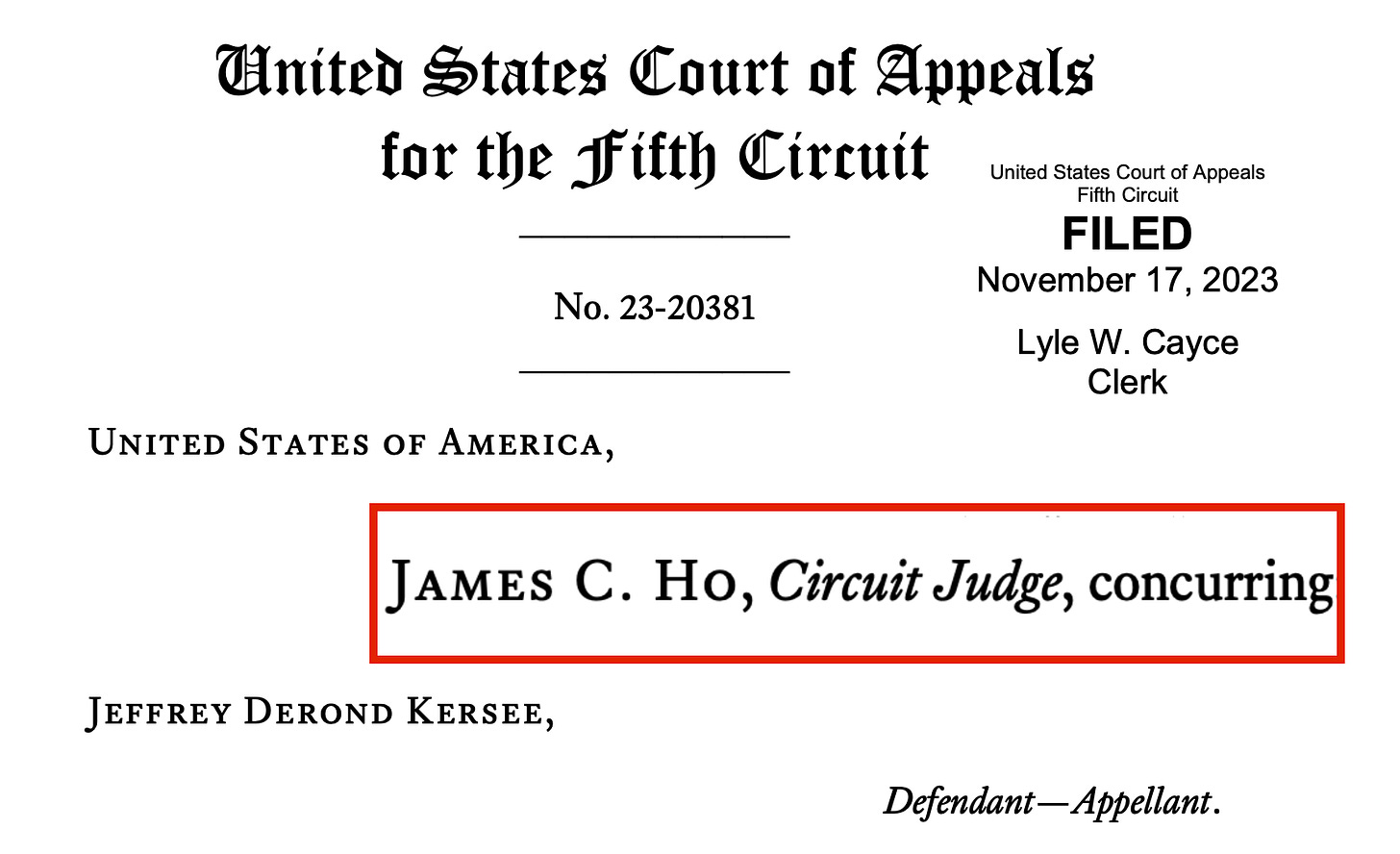Fifth Circuit judge defends lower-court ruling in Rahimi, domestic-violence order gun ban case
The arguments at SCOTUS didn't go well for Zackey Rahimi, but Judge James Ho isn't done with the case just yet. Also: RIP, Rosalynn Carter.
Judge James Ho submitted what amounts to the judicial version of a post-argument supplemental filing in United States v. Rahimi on Friday.
Rahimi, you might recall, is the case the justices of the U.S. Supreme Court heard arguments in earlier this month about whether the federal law criminalizing firearm possession by people with a domestic violence restraining order out against them.
The Trump appointee to the U.S. Court of Appeals for the Fifth Circuit issued the non-filing filing Friday as a concurrence in a different case raising different issues, but, when you’re a federal judge, you work with the opportunities you’re given.
The Nov. 7 arguments in Zackey Rahimi’s case were pretty universally seen as having gone poorly for Rahimi, who argues that the ban is unconstitutional in light of the Supreme Court’s recent Second Amendment cases (most recently, N.Y. State Rifle & Pistol Assoc. v. Bruen).
The Biden administration, defending the law, brought the Rahimi case to the Supreme Court, asking the court to reverse a decision of the U.S. Court of Appeals for the Fifth Circuit striking down the federal provision at issue, 18 U.S.C. Section 922(g)(8).
Ho had been on the Fifth Circuit panel that heard Rahimi’s appeal. He agreed with the majority that Section 922(g)(8) is unconstitutional, yet wrote a separate concurrence. As he explained in the March opinion:
The Supreme Court granted review of Rahimi’s case before leaving for its summer recess. Briefing took place over the summer and into the fall, with arguments held Nov. 7. Almost everyone to watch or listen to the arguments concluded that the justices are likely to uphold the constitutionality of Section 922(g)(8).
Ten days later, on Nov. 17, Ho made three things clear: He was aware of how the arguments went in Washington, D.C., he wanted to defend the Fifth Circuit’s ruling, and he has not given up on the Supreme Court.
Ho found himself on a three-judge panel hearing Jeffrey Kersee’s appeal of a decision revoking his supervised release and ordering him sent him back to prison. The case involved a possible domestic violence incident in which charges were initially filed against Kersee but later dismissed. The question on appeal was whether it was acceptable that a federal court revoked his supervised release following a hearing based on those dismissed charges and the documentary evidence involved in that incident where Kersee had no opportunity to confront any of the witnesses against him because the government called no witnesses.
The Fifth Circuit, in a unanimous decision, held it was not acceptable because it violated Kersee’s due process rights. The lower court order was vacated and a new hearing was ordered.
Although Ho agreed with the court’s decision — authored by Judge James Graves Jr., an Obama appointee — he wrote another concurring opinion.
From the opening sentence, Ho made it clear he was writing via Kersee but about Rahimi.
“I write separately to observe that the court grants relief, not because it is insensitive to domestic violence or the safety of Kersee’s girlfriend, but because it is sensitive to the constitutional rights of the accused,” Ho wrote, leading into the purpose of his concurrence. “In that respect, the decision today reminds me of our decision in Rahimi.“
And, there it was. Although he didn’t come out and say it, it’s clear that Ho does not think that the arguments in D.C. properly got the issues and interests in Rahimi.
Purportedly explaining the similarity of the constitutional issues in Kersee and Rahimi’s cases, Ho essentially moves on to a defense of Rahimi that he apparently felt was missing on Nov. 7:
[I]n Rahimi, we followed the Court’s directives and conceptualized Bruen, not as a substantive right of dangerous criminals to run armed and free, but as a procedural protection for those subject to disarmament on suspicion of criminal activity. … We concluded that, to survive Bruen, the use of civil protective orders to disarm citizens must presumably, and at a minimum, approximate the protections afforded to those accused of a crime.
Giving a nod to the case in which he was writing, Ho concluded that section of his opinion by writing, “The lack of adequate procedural safeguards rendered the statute in Rahimi deficient on its face. And for the same reasons, the court is right to grant relief to Kersee as well.”
After highlighting what he viewed as another similarity in the cases, he then concluded by echoing a point from his March concurrence in Rahimi’s case:
It’s not clear whether it will have any effect on the decision in Rahimi at the Supreme Court, but it is clear Ho remains defiantly in defense of the ruling — not as a Second Amendment defense, but rather as a criminal procedure safeguard.
Remembering Rosalynn Carter
On Sunday, Rosalynn Carter, the wife of former President Jimmy Carter, died at 96.
The Atlanta Journal-Constitution’s beautiful obituary of the former first lady of the United States and Georgia is a celebration of her incredible life and the life she shared with her husband.
It’s a read that no one should miss about a life whose effects will carry on with her husband and far beyond.







That man is high on his own supply.
Judge Ho is and always will be a power seeking ass Ho I’m done